Table of Contents
ToggleIn the fast-paced world of business, adapting to technological advancements and staying ahead of the competition is crucial. One area that often sparks discussions and misconceptions is custom software development. Despite its undeniable benefits, myths about custom software have persisted, preventing businesses from fully embracing this powerful tool. In this comprehensive article, we’ll debunk these myths one by one, shedding light on the reality of custom software development and its immense value to businesses of all sizes.
Defining Custom Software Development
Custom software development involves creating tailor-made software solutions to meet the specific needs of a business. Unlike off-the-shelf software, custom solutions are designed from the ground up to align perfectly with a company’s unique processes and objectives. While misconceptions exist, custom software is not solely reserved for large enterprises; it offers benefits to businesses of all scales.
Importance of Debunking Myths
Before we dive into the myths, let’s underscore the significance of dispelling these misconceptions. A clear understanding of custom software development empowers businesses to make informed decisions, harness the potential of technology, and achieve optimal results.
Myth #1: Custom Software is Only for Large Enterprises
Addressing Misconceptions About Target Audience
Contrary to popular belief, custom software is not exclusive to large corporations. It caters to businesses of all sizes, offering tailored solutions that address common challenges, including software outsourcing. Small and medium-sized businesses can leverage custom software to streamline operations, enhance efficiency, and gain a competitive edge.
Benefits for Small and Medium-Sized Businesses
Custom software empowers small and medium-sized businesses by providing targeted solutions that cater to their unique needs. This approach ensures optimal resource utilization, prevents unnecessary features, and focuses on delivering maximum value.
Myth #2: Custom Software is Exorbitantly Expensive
Analyzing Cost Factors in Custom Development
One of the most pervasive myths surrounding custom software development is its purported high cost. While the initial investment in custom software might appear higher, it’s essential to consider the long-term value it brings. Custom solutions eliminate the need for costly workarounds and offer a scalable foundation for future growth. Off-the-shelf solutions might appear more cost-effective upfront, but they often necessitate workarounds, additional licenses, and adaptations that accumulate expenses over time. Custom software eliminates these hidden costs, providing a solution tailored precisely to the organization’s needs, resulting in optimal resource utilization and significant savings.
Comparing Long-Term Value with Initial Investment
Custom software development is not merely a one-time investment; it’s an enduring commitment to efficiency and innovation. The initial development cost is outweighed by the software’s ability to enhance operations, minimize manual interventions, and adapt seamlessly to changing requirements. This long-term value makes custom software development a strategic move that positions businesses for success, scalability, and sustained competitiveness.
Myth #3: Off-the-Shelf Software is Just as Effective
Differentiating Custom vs. Off-the-Shelf Software
Off-the-shelf software solutions are designed to cater to a broad audience, compromising on the unique requirements of individual businesses. Custom software, on the other hand, is built to align perfectly with a company’s goals and processes.
Tailoring Solutions to Unique Business Needs
Custom software development allows businesses to create solutions that mirror their workflow, resulting in improved productivity and user satisfaction. This tailored approach enhances performance and efficiency across all levels of the organization.
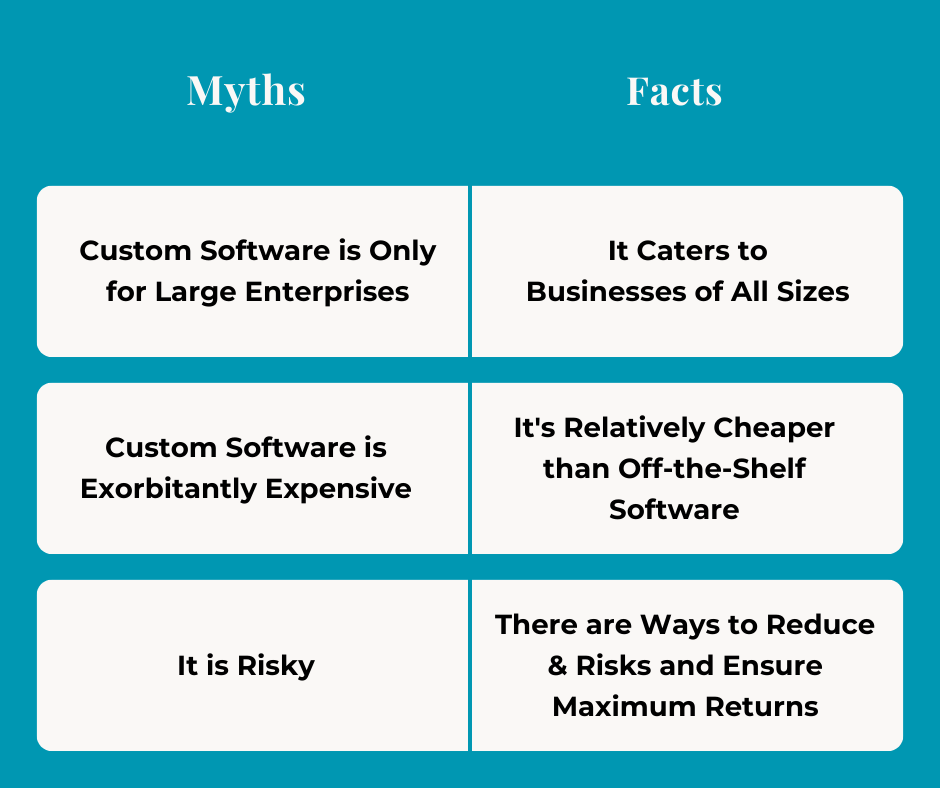
Myth #4: Custom Software Development is Time-Consuming
Exploring Factors Influencing Development Timeline
While custom software development does require time, the perception that it’s excessively time-consuming is a misconception. Efficient project management, clear requirements, and agile methodologies can streamline the development process.
Agile Methodologies for Efficient Development
Agile methodologies are central to accelerating custom software development. By breaking the project into manageable iterations, businesses can witness tangible progress within shorter timeframes. This approach fosters collaboration, adapts to changing requirements, and ensures that the final product aligns perfectly with the organization’s goals.
Myth #5: One-Size-Fits-All Development Approach
Emphasizing the Need for Tailored Solutions
In today’s dynamic business landscape, a generic approach rarely suffices. Custom software development allows businesses to address their unique challenges and opportunities, providing a competitive edge through specialized functionality.
Showcasing Flexibility in Custom Software Development
Custom solutions are inherently flexible and can adapt to evolving business needs. As the company grows or pivots, the software can be updated to align with new objectives, ensuring ongoing relevance and efficiency.
Myth #6: Custom Software is Prone to Extensive Bugs
Debunking Quality Concerns in Custom Development
Quality control is a top priority in custom software development. Rigorous testing, quality assurance processes, and continuous monitoring are integral to delivering bug-free and reliable solutions.
Rigorous Software Testing and QA Processes
Custom software undergoes meticulous testing phases to identify and rectify issues before deployment. This dedication provides the highest software quality and ensures that the final product meets the highest standards of performance and reliability.
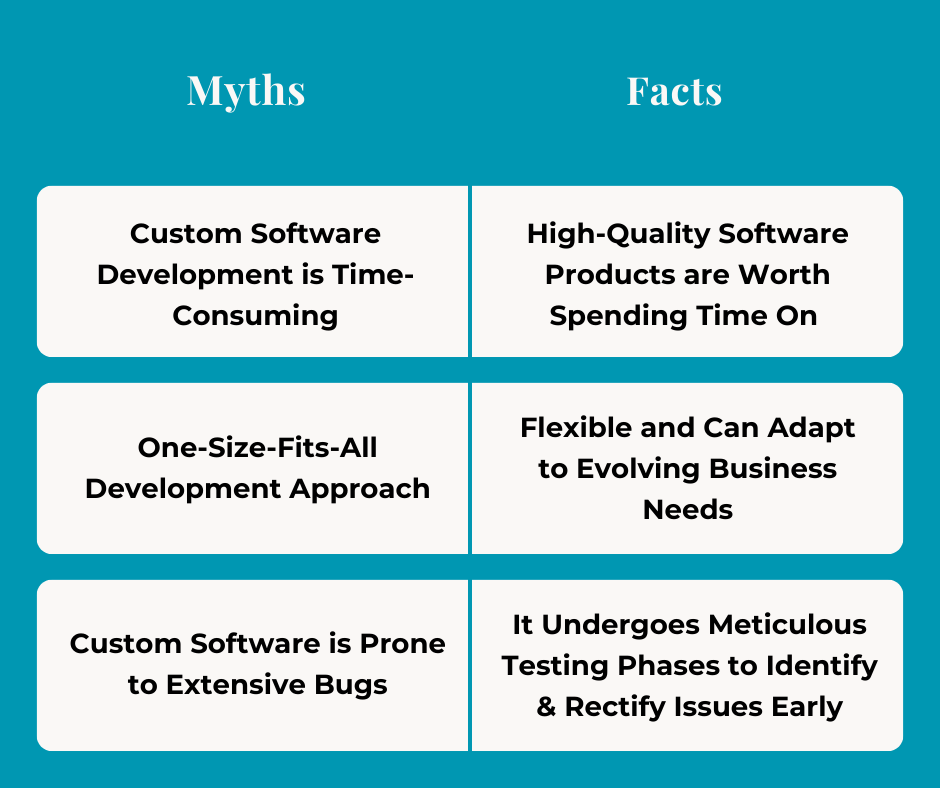
Myth #7: Custom Software is Difficult to Maintain
Highlighting the Importance of Ongoing Maintenance
Maintenance is an integral part of any software’s lifecycle. Custom software development includes provisions for regular updates, bug fixes, and improvements to keep the software aligned with changing business needs.
Implementing Strategies for Streamlined Updates
Custom development companies design bespoke software with maintainability in mind. Through careful architecture and modular design, updates can be seamlessly integrated without disrupting core functionality.
Myth #8: User Experience is Neglected in Custom Software
Integrating User-Centric Design in Custom Solutions
User experience (UX) is integral to custom software development. Designing intuitive interfaces and optimizing user workflows are central to ensuring software adoption and user satisfaction.
Ensuring Intuitive Interfaces and Positive Interactions
Customized solutions are designed with the end-users in mind. Extensive research, iterative design processes, and adequate UX testing result in software that is both functional and user-friendly.
Myth #9: Custom Software is Overkill for Simple Needs
Addressing Misconceptions About Project Complexity
Custom software development is not solely for complex projects. Even seemingly simple needs can benefit from customization, as it ensures that the software aligns perfectly with the organization’s objectives.
Complexity often deters businesses from exploring customized solutions. However, custom software development is tailored precisely to an organization’s needs, eliminating unnecessary features and focusing solely on functionality that enhances efficiency.
Scaling Solutions for Future Growth
A custom software development company with expert software engineers who designs tailored solutions with scalability in mind. This means that as the business grows, the software can be expanded and enhanced to accommodate increased demand and evolving requirements.
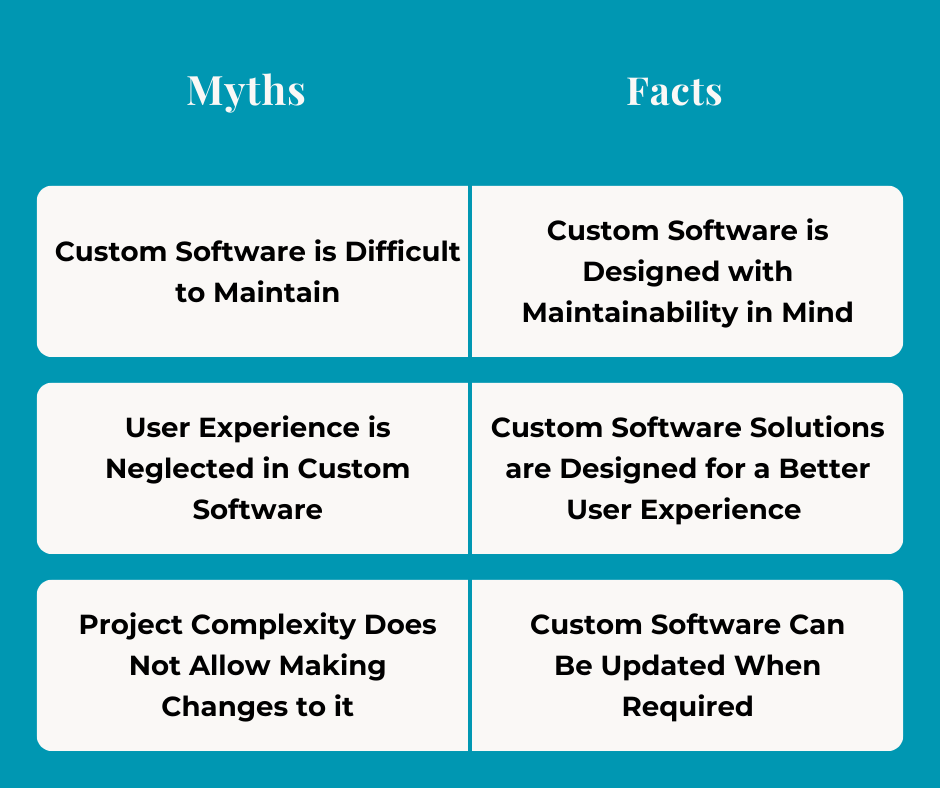
Myth #10: Developers Decide Everything in Custom Software
Collaborative Development Process Involving Clients
Custom software development is a collaborative endeavor. While developers provide expertise, client input is invaluable in ensuring that the software addresses specific business challenges.
Balancing Expertise with Client Input
Clients bring firsthand knowledge of their business processes and requirements. Developers combine this insight with technical expertise to create solutions that are both functional and aligned with the client’s vision.
Myth #11: Custom Software is Not Secure
Prioritizing Security Measures in Development
Security is a paramount concern in custom software development. Developers implement robust security measures to safeguard data and protect against vulnerabilities.
Mitigating Vulnerabilities Through Best Practices
Custom software development companies build tailored solutions by following industry best practices for security. This includes regular security audits, encryption, and adherence to compliance standards to ensure the highest level of protection.
Myth #12: Custom Software is Limited by Hardware
Adapting Software to Various Hardware Environments
Custom software developers design customized solutions to operate seamlessly across different hardware environments. Compatibility is a priority, ensuring that the software performs optimally regardless of the devices it’s accessed from.
Leveraging Cloud Technologies for Scalability
Cloud technologies further enhance the adaptability of custom software solutions. Cloud-based deployment allows businesses to scale resources up or down based on demand, providing a seamless user experience.
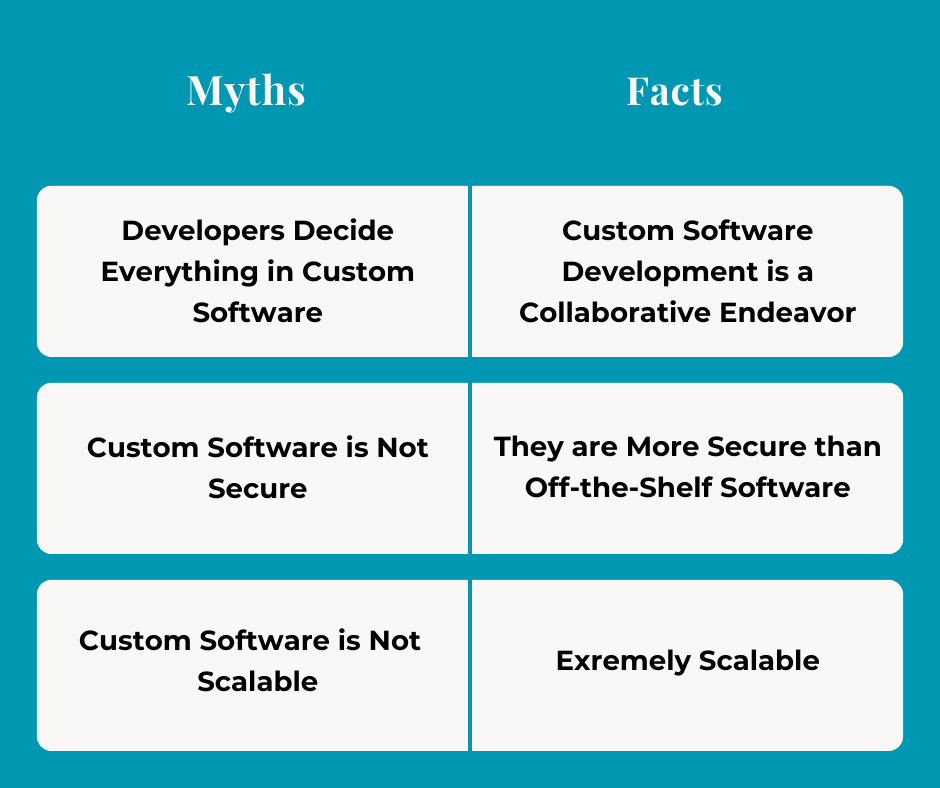
Myth #13: Immediate and Universal ROI with Custom Software
Realistic Expectations for Return on Investment
While custom software development delivers substantial ROI, it’s important to set realistic expectations. The benefits may not be immediately apparent, but over time, the software becomes a valuable asset.
Long-Term Benefits That Extend Beyond Initial Launch
Custom software’s true value is realized in its long-term impact. As the software evolves with the business and streamlines operations, the ROI becomes increasingly evident.
Myth #14: All Custom Projects Require Full-Scale Development
Exploring Modular and Phased Development Approaches
Custom software projects can be tailored to the organization’s needs, allowing for modular or phased development. This approach provides flexibility, adaptability, and the ability to address the most pressing needs first.
Maximizing Efficiency and Adapting to Changing Needs
Modular development allows businesses to maximize efficiency by focusing on priority features first. As requirements change or new opportunities arise, additional modules can be seamlessly integrated.
Myth #15: Third-Party Integration is Cumbersome
Streamlining Integration Processes with APIs
Third-party integration is crucial for businesses to leverage existing tools and systems. Custom software development incorporates APIs (Application Programming Interfaces) to facilitate seamless communication between different platforms.
Ensuring Seamless Collaboration Between Systems
APIs enable custom software to interact with other software solutions, ensuring a cohesive and efficient workflow. This integration streamlines operations and minimizes manual data transfer.
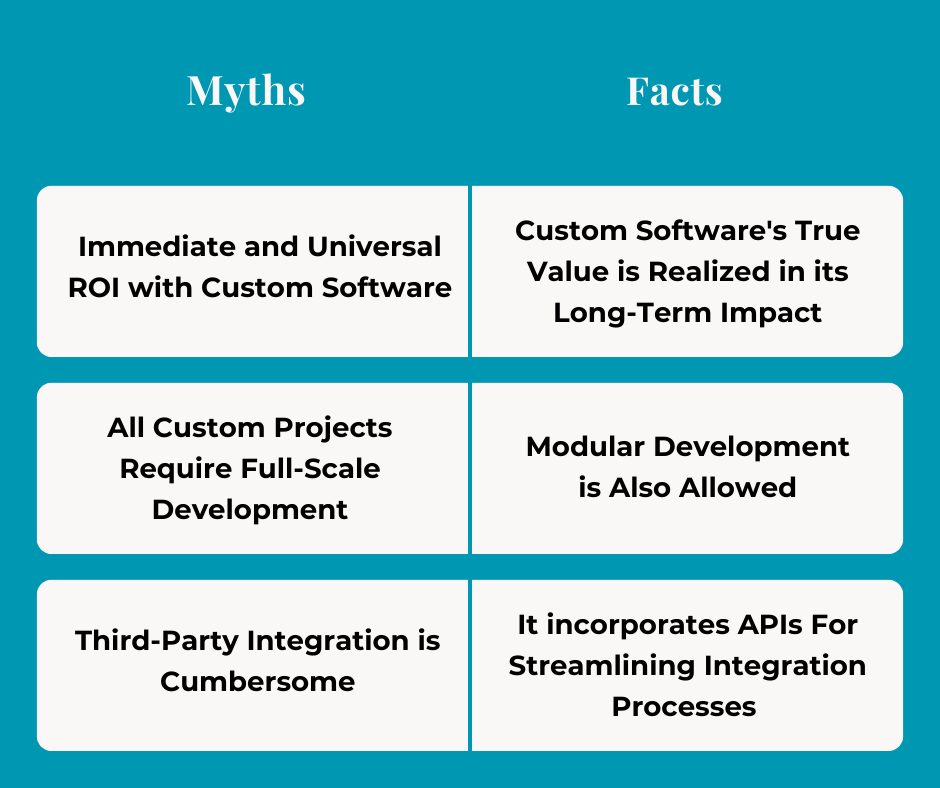
Myth #16: Custom Software Eliminates All Manual Processes
Automating Repetitive Tasks with Custom Solutions
Custom software development focuses on automating repetitive and time-consuming tasks. However, not all manual processes are eliminated; instead, the software enhances efficiency where automation is most beneficial.
Identifying Areas Where Manual Intervention is Still Valuable
Certain manual processes hold strategic value or require human expertise. Custom software development identifies these areas, striking a balance between automation and human intervention.
Myth #17: Custom Software is a One-Time Investment
Recognizing the Need for Continuous Improvement
Custom software development is an ongoing journey. The software evolves with the business, accommodating changing needs, technologies, and market dynamics.
Evolving Software to Align with Evolving Business Goals
In order to ensure continued relevance, businesses should allocate resources for regular updates and improvements. This approach aligns the software with the organization’s evolving goals and strategies.
Myth #18: All Development Teams Provide the Same Quality
Evaluating Criteria for Selecting a Reliable Development Partner
Not all development teams are created equal. Selecting the right partner is crucial for a successful custom software project. Factors such as expertise, portfolio, and communication skills play a pivotal role.
Importance of Research and Due Diligence
Thoroughly researching potential development partners is essential. Client testimonials, case studies, and a demonstrated understanding of the client’s industry contribute to a confident selection.
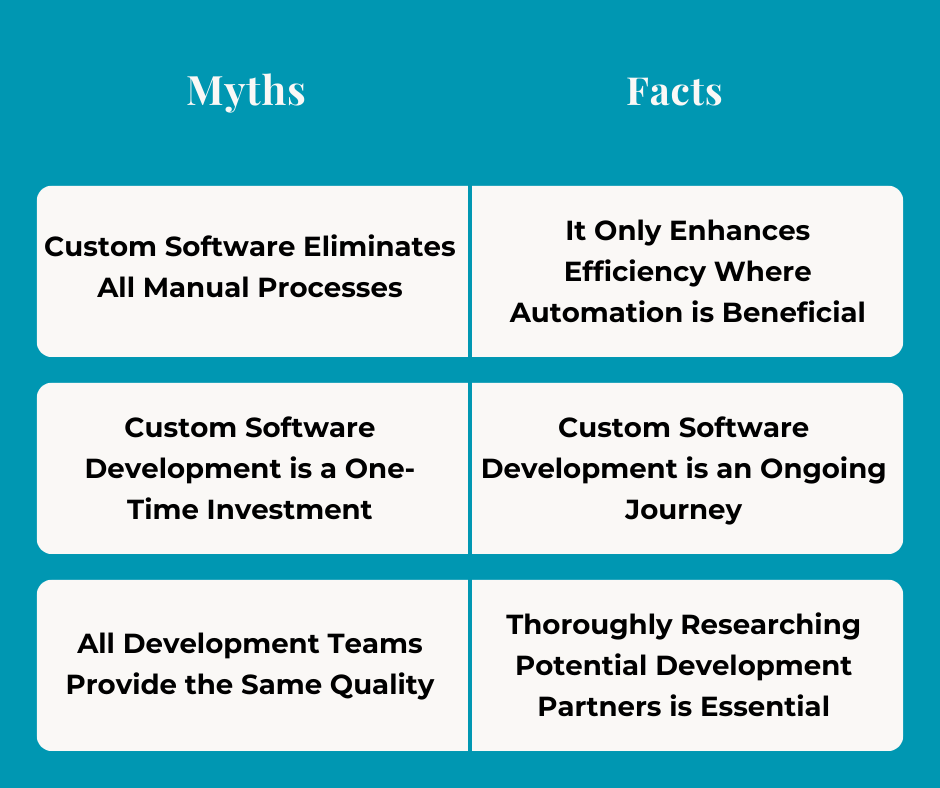
How Does Custom Software Add Value to Businesses?
Custom software, unlike generic off-the-shelf software, is designed to cater to the specific requirements of a business. This tailor-made approach offers a wide range of benefits that can significantly impact a company’s operations, growth, and bottom line. Let’s delve into how businesses can leverage custom software to their advantage.
1. Tailored Solutions for Unique Business Needs
Every business has its unique processes, challenges, and goals. Custom software development allows companies to create solutions that perfectly align with their operations, ensuring optimal performance and efficiency. This tailored approach ensures that no resources are wasted on unnecessary features, resulting in a lean and focused system.
2. Enhancing Productivity and Efficiency
Custom software can automate repetitive tasks, reducing human errors and freeing up valuable employee time. With streamlined workflows, employees can focus on higher-value tasks that directly contribute to the business’s growth. This boost in productivity can lead to better resource utilization and increased profitability.
3. Improving Customer Experiences
In today’s customer-centric world, providing exceptional experiences is a competitive advantage. Custom software enables businesses to develop applications and platforms that cater directly to their customers’ needs. From user-friendly interfaces to personalized interactions, businesses can build strong customer loyalty and positive brand perception.
4. Streamlining Complex Operations
Many businesses have intricate operations that require specialized tools to function seamlessly. Off-the-shelf solutions often fall short of meeting these complex needs. Custom software can integrate various processes into a unified system, simplifying even the most intricate operations.
5. Fostering Innovation and Competitive Edge
Custom software empowers businesses to innovate by providing unique solutions to industry-specific challenges. With the ability to develop cutting-edge features and functionalities, companies can differentiate themselves from competitors and capture new market opportunities.
6. Cost-Effectiveness in the Long Run
While the initial investment in custom software development might be higher than buying off-the-shelf solutions, the long-term benefits outweigh the costs. Custom software eliminates licensing fees, reduces maintenance expenses, and minimizes the need for additional software purchases.
7. Scalability and Flexibility
As businesses grow, their software needs to scale accordingly. Tailored software can be crafted to prioritize scalability, enabling it to grow in tandem with a company’s expansion. Moreover, the adaptable nature of tailor-made software permits quick adaptations to shifting business needs.
8. Security and Data Protection
Off-the-shelf solutions can present security risks due to their widespread usage. Custom software offers greater security, as it is less targeted by some common cyber threats. Companies can implement robust security measures that safeguard sensitive data and protect business interests.
9. Integration with Existing Systems
Most businesses rely on a combination of software solutions to operate efficiently. Custom software can be seamlessly integrated with existing systems, eliminating data silos and ensuring smooth information flow across departments.
Challenges and Considerations in Custom Software Development
While custom software offers numerous benefits, it’s essential to acknowledge the challenges and considerations. Factors such as development time, budget constraints, and potential technical complexities need to be carefully assessed.
Requirements Gathering and Scope Definition
One of the biggest challenges is accurately defining the project’s requirements and scope. Misunderstandings or changes in requirements during development can lead to delays, budget overruns, and unsatisfactory outcomes.
Time and Budget Management
Custom software projects created by software engineers can sometimes take longer and cost more than initially estimated. Balancing time, budget, and quality is crucial to avoid project overruns.
Technical Complexity
Depending on the complexity of the desired features, the software development process can become technically challenging. Integrating various technologies, platforms, or third-party services might require specialized expertise.
Talent and Expertise
Finding and retaining skilled software developers, designers, and project managers is essential. The shortage of qualified professionals in the field can impact project timelines and quality.
Adaptability to Change
Businesses and markets are dynamic, which means that requirements can change mid-development. The software development process should be agile enough to accommodate changes without derailing the project.
Other Challenges
Other challenges include:
- User Experience (UX) Design: Designing a user-friendly interface and ensuring a positive user experience is critical. Poor design can lead to user frustration and adoption issues.
- Testing and Quality Assurance: Rigorous testing is essential to identify and fix bugs, ensure functionality, and guarantee security. Inadequate testing can lead to post-launch issues and customer dissatisfaction.
- Data Security and Privacy: Custom software may handle sensitive customer data. Ensuring robust security measures and compliance with data privacy regulations is paramount.
- Scalability: As a business grows, the software should be able to handle increased user loads and data volumes. Designing for scalability from the outset prevents future complications.
- Vendor Dependency: Custom software may create a dependency on the development team or vendor. Ensuring proper documentation and knowledge transfer is crucial to avoid issues if the development team changes.
- Maintenance and Support: Software requires ongoing maintenance and support after launch. Businesses need to plan for updates, bug fixes, and improvements to keep the software relevant and functioning.
- Cost-Effectiveness: Custom software development can be expensive, and the return on investment might not be immediately apparent. Businesses should weigh the long-term benefits against the initial costs.
- Legal and Intellectual Property Considerations: Ownership of the software’s source code and intellectual property rights should be clearly defined in contracts. Businesses should also consider potential legal issues, such as licensing and copyright.
Future Trends in Custom Software
The world of technology is ever-evolving, and custom software development is no exception. Emerging trends such as AI development, IoT connectivity, and immersive experiences are shaping the future of custom software, promising even more value for businesses.
To Sum Up
In the ever-evolving landscape of technology, debunking myths surrounding custom software development is imperative. As we’ve explored in this article, custom software isn’t exclusive, expensive, or prone to issues. It’s a powerful tool that aligns with businesses of all sizes, providing tailored solutions that drive efficiency, innovation, and growth. By understanding the reality of custom development, businesses can confidently embrace this transformative solution, leaving misconceptions behind.
FAQs: Common Questions about Custom Software Development
What is custom software?
Custom software refers to software applications developed specifically for a particular business or organization, addressing its unique needs and challenges.
Is custom software suitable for small businesses?
Absolutely. Custom software provides tailored solutions that can enhance efficiency and competitiveness for small businesses.
How can I ensure the security of my custom software?
Software developers prioritize security in the development process through best practices, regular audits, and encryption to protect against vulnerabilities.
What factors influence the custom software development cost?
Factors include complexity, features, integration needs, and ongoing maintenance.
What is the typical timeline for developing custom software?
Timeline varies based on project scope and complexity, but efficient methodologies like Agile can accelerate development.
How can I choose a perfect development team for my software development projects?
Evaluate expertise, portfolio, communication skills, and industry understanding when selecting a reliable development partner for your software development projects.
How does custom software improve productivity?
Custom software automates tasks, reduces errors, and optimizes workflows, leading to increased employee productivity.
Is custom software cost-effective for small businesses?
While the initial investment might be higher, custom software’s long-term cost-effectiveness becomes evident through reduced maintenance costs and tailored features.
Can custom software be integrated with existing software?
Yes, custom software can be seamlessly integrated with existing software, ensuring smooth data flow and collaboration.
What are the security benefits of custom software?
Custom software provides enhanced security as it’s less vulnerable to common cyber threats, and specific security measures can be implemented during development.
Embrace the potential of custom software development to revolutionize your business processes and drive unprecedented growth. With misconceptions dispelled and a clear understanding of its benefits, you can harness the power of technology to stay ahead in the competitive business landscape.




























